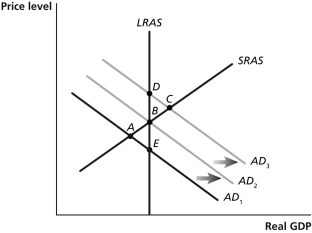Exam 16: Fiscal Policy
What is the difference between federal purchases and federal expenditures?
Federal purchases refer to federal spending where the federal government receives a good or service in return,like an aircraft carrier.Federal expenditures include federal purchases plus interest on the national debt,grants to state and local governments,and transfer payments.
What are the key differences between how we illustrate a contractionary fiscal policy in the basic aggregate demand and aggregate supply model and in the dynamic aggregate demand and aggregate supply model?
In the basic aggregate demand and aggregate supply model,contractionary fiscal policy is illustrated by a leftward shift of the aggregate demand curve,with the short-run aggregate supply curve and long-run aggregate supply curve remaining stationary.The dynamic aggregate demand and aggregate supply model takes into account the economy experiencing continuing inflation from year to year and the economy experiencing long-run growth.In the dynamic model,contractionary fiscal policy is illustrated by a rightward shift of the aggregate demand curve which is less than the rightward shifts of the short run aggregate supply curve and the long run aggregate supply curve.
Does expansionary fiscal policy directly increase the money supply? Isn't it true that the president and Congress fight recessions by spending more money?
No,expansionary fiscal policy does not directly increase the money supply.The president and the Congress fight recessions by increasing spending,not the money supply,by either increasing government spending or cutting taxes to increase household disposable income and,therefore,consumption spending.
Before the Great Depression of the 1930s,the majority of government spending took place at the ________ and after the Great Depression the majority of government spending took place at the ________.
If policy makers implement an expansionary fiscal policy but do not take into account the potential for crowding out,the new equilibrium level of GDP is likely to
Following a decrease in government spending,as the price level falls we would expect the level of interest rates to ________ and investment to ________.
The majority of the federal government debt is held by government agencies.
If the absolute value of the tax multiplier equals 1.6,real GDP is $13 trillion,and potential real GDP is $13.4 trillion,then taxes would need to be cut by ________ to restore the economy to potential real GDP.
Economists who believe the supply-side effects of tax cuts are small essentially believe that
An appropriate fiscal policy response when aggregate demand is growing at a slower rate than aggregate supply is to cut taxes.
Suppose real GDP is $12.1 trillion and potential GDP is $12.6 trillion.To move the economy back to potential GDP,Congress should
Suppose the government wants to maintain a balanced budget.To achieve this goal,when the economy falls into recession government would need to ________ taxes,which would cause aggregate demand to ________.
Which of the following is the largest category of federal government expenditures?
Explain why the tax multiplier is different from the government purchases multiplier,in both sign and relative magnitude.
The crowding out of private spending by government spending will be greater the
The automatic budget surpluses and budget deficits that occur in the federal budget over the business cycle
In preparing their estimates of the stimulus package's effect on GDP,Obama administration economists estimated a government purchases multiplier of 1.57.Economist Robert Barro argues that during wartime,the government purchases multiplier would be ________ the administration's estimate,and economists Lawrence Christiano,Martin Eichenbaum,and Sergio Rebelo argued that when short-term interest rates are near zero,the multiplier would be ________ the administration's estimate.
Figure 16-1  -Refer to Figure 16-1.Suppose the economy is in short-run equilibrium below potential GDP and no fiscal or monetary policy is pursued.Using the static AD-AS model in the figure above,this would be depicted as a movement from
-Refer to Figure 16-1.Suppose the economy is in short-run equilibrium below potential GDP and no fiscal or monetary policy is pursued.Using the static AD-AS model in the figure above,this would be depicted as a movement from
Filters
- Essay(0)
- Multiple Choice(0)
- Short Answer(0)
- True False(0)
- Matching(0)